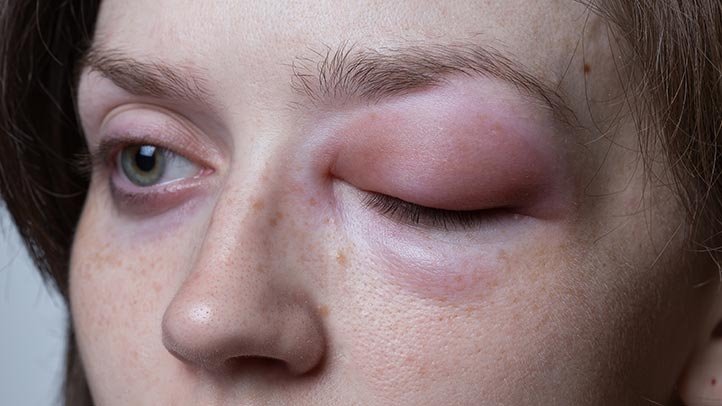Although a lot of people have heard about hereditary angioedema, most of them might not be aware of how serious this condition can be – especially since it can be life-threatening at times. It is a rare, genetic disorder that triggers swelling under the skin, as well as the lining of the stomach and lungs. It can, of course, happen in different parts of the body.
If you are interested in learning more about this condition, you might find this article quite helpful. Before we take a look at the list of treatment options, we will first take a look at what this condition is, as well as what can cause the swelling to occur. Let’s take a closer look at the article:
Hereditary Angioedema: Explained

The first thing you should know is that people are born with hereditary angioedema or HAE for short. Though people born with this condition will have to live with it for the rest of their lives, there are treatment options that can help them control and manage the symptoms of the condition.
The symptoms of this illness usually show during early childhood, and it can and often does get worse as the person enters adolescence. To put it simply, people suffering from this condition have specific proteins that are not balanced and this is what prompts small blood vessels to push liquids into the closest parts of the body – this is what leads to swelling.
Now, keep in mind that where the swelling happens, how often, and how intensive it is will be different for each individual suffering from this condition. It can come and go, and it can occur in different body parts every time an attack happens. The inflammation does usually go away, however, it can also be life-threatening.
The life-threatening event can happen when the throat swells, especially since it can cut off your air supply, which means that it can get serious and even deadly. Hence, if you are suffering from this genetic disorder and you notice your throat swelling, call the ambulance right away.
How often the attacks will happen can drastically vary. For example, someone can suffer from an attack once or twice in a month, however, some people might experience attacks once or twice a year. Although they might happen less or more often, the attacks and symptoms are often difficult to manage. If you want to see more information about this illness, check out WeAreHAE.
What Are The Treatment Plans?

As previously mentioned, this condition cannot be treated, however, there are specific medications that can help people prevent, manage, as well as treat the swelling that occurs from this genetic disorder. But, keep in mind that we will not mention the specific names of the medication. Now, you might be wondering why will you not mention it when it can help? Well, the answer is simple.
The article above stated that this condition affects people in different ways, hence, what might work for someone might not work for you. Besides that, before taking any medicine for treating this condition, you must consult your doctor, especially since taking the wrong medicine can lead to further complications – and some of them can even be life-threatening.
So, this means that you can read about how the medicine affects your body and manages the symptoms, but you will need to consult your physician in order to find the names of the medicine. Let’s take a closer look at how you can treat the symptoms:
How to Prevent Swelling?
Your doctor will probably recommend two types of medication that can reduce the swollen areas. They will boost your levels of C1 esterase inhibitor in your bloodstream – and as previously stated, the low levels are what prompts the swelling. There are of course side effects that can include weight gain and higher blood pressure, however, if the side effect occurs, there are alternatives that your physician can prescribe.
The treatment that is most commonly given to patients include:

1. A medicine that is applied as an injection that will block all of the effects that the unbalanced chemicals create in your body. It will especially affect and prevent the swelling that occurs.
2. A medicine that is also applied as an injection, however, instead of blocking the effects, it will boost the amount of C1 esterase inhibitor in your body.
Since it is a condition that cannot be cured, you should also take care of yourself. There are some things that you should remember including:

1. Research The Illness And Learn More – by learning everything there is about this genetic condition, you will be able to make better lifestyle choices, as well as the treatment plan and medicine your doctor prescribed.
2. Know Your Triggers – there are various things that can trigger swelling, hence, once you figure out what they are, make sure to avoid those things. You can do so by tracking when the attacks happened, as well as what you were eating or doing at that time.
3. Talk to Your Physician Before Going to The Dentist – never forget to talk to your doctor before going to the dentist. He/she might tell you what medicine you should not take in order to avoid inflammation.
4. Inform Your Family, Friends, And Colleagues About Your Condition – this is extremely important since you might not be able to call an ambulance if your airflow gets cut off. This is why you should inform the people closest to you about your condition.
5. Know When to Call 911 – if you start noticing that your throat is swelling, do not waste a single second and call 911 right away. This can save your life, especially since you will not be able to talk if your airflow is restricted.
Conclusion
As you can see, hereditary angioedema is a genetic condition that can get quite serious, and if left untreated, it can lead to life-threatening complications. So, now that you know what the treatment plan is, as well as what you should be careful about, do not waste any more time and make an appointment with your doctor in order to determine what the best treatment is for you.
 Hi Boox Popular Magazine 2024
Hi Boox Popular Magazine 2024



